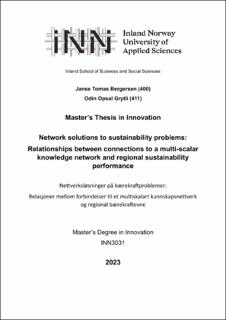| dc.contributor.advisor | | |
| dc.contributor.author | Janse Tomas Bergersen | |
| dc.contributor.author | Odin Opsal Grytli | |
| dc.date.accessioned | 2023-08-12T16:10:31Z | |
| dc.date.available | 2023-08-12T16:10:31Z | |
| dc.date.issued | 2023 | |
| dc.identifier | no.inn:inspera:152686597:105874328 | |
| dc.identifier.uri | https://hdl.handle.net/11250/3083667 | |
| dc.description.abstract | Å oppfylle EUs mål om karbonnøytralitet innen 2050 vil kreve forbedring i regional bærekraftevne og i energiinnovasjon, produksjon og forbruk. Denne avhandlingen undersøker hvordan nettverkseffekter kan bidra til denne utviklingen ved å undersøke forholdet mellom forbindelser til et multiskalart kunnskapsnettverk og regional bærekraftevne. Dette ble oppnådd gjennom bruk av nettverksdata basert på Horizon 2020 (2014-2020 perioden) sine energiprosjekter og data på regional innovasjonsevne fra Regional Innovation Scoreboard 2021. Ved å kombinere økonometri og sosial nettverks analyse viser våre resultater at reell posisjonering i nettverkskjernen er relatert til en gradvis økning i regional bærekraftevne gjennom reduksjoner i PM2.5 utslipp. Videre indikerer resultatene våre at perifere regioner potensielt kan styrke deres bærekraftevne ved å utnytte nettverkseffektene gjennom nøkkelposisjonering i kunnskapsnettverket, og dermed omgå behovet for reell posisjonering i nettverkskjernen. Baser på disse resultatene argumenterer vi for at lokale og globale beslutningstakere i EU bør gjøre en økt innsats for å inkludere perifere og vanskeligstilte regioner i EUs rammeprogrammer. | |
| dc.description.abstract | Reaching the EU goal of carbon neutrality by 2050 will require advancements in regional sustainability performance and in energy innovation, production and consumption. This thesis examines how network effects can contribute to these advancements by investigating the relationship between connections to a multi-scalar knowledge network and regional sustainability performance. This was achieved through the use of network data based on the Horizon 2020 (2014-2020 period) Energy Programmes and data on regional innovation performance from the Regional Innovation Scoreboard 2021. By combining econometrics and social network analysis, our empirical results shows that actual positioning in the in the core of a knowledge network is related to gradual increases in regional sustainability performance through reductions in PM2.5 air emissions. Furthermore, our results indicate that peripheral regions might potentially be able to strengthen their sustainability performance by utilizing network effects through key positioning in the network, thereby bypassing the need for an actual positioning in the core network. Based on these results, we argue that local and global policymakers in the EU should make increasing efforts to include peripheral and struggling regions in the EU framework programmes. | |
| dc.language | eng | |
| dc.publisher | Inland Norway University | |
| dc.title | Network solutions to sustainability problems:
Relationships between connections to a multi-scalar knowledge network and regional sustainability performance | |
| dc.type | Master thesis | |
